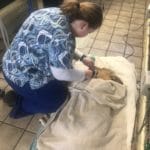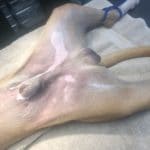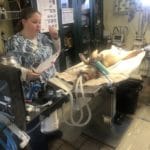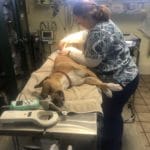Hi there ???? I think I would chat with the vet at his next checkup and see what their thoughts are. There is always a risk with surgery, but if the pros outweigh the cons, then the answer is obvious. At this stage though, if your vet feels they aren’t a threat and you feel that the dog’s quality of life isn’t effected, then those would be strong factors in determining what the next step would be. You and your vet know your guy best, so that would be where I would start my discussion. Best of luck!!!
I am so lost in caring for my Chihuahua/dachshund mix. She was diagnosed with IVDD on Sunday December 15, 2019. Surgery was not an option financially so we opted for conservative treatment combined with acupuncture and the Assisi loop treatments. The one thing I can not get a definitive answer on if she needs to 24/7 cage rest of if letting her rest with us on the couch in the evenings okay. Some blogs says strict cage rest for 8 weeks and only out for potty time while many others suggest other treatment plans. I just want to know if I am hurting my fur baby by letting her rest on the couch with me or not. Since the start of her treatments she has gone from full paralysis in her hind legs and being in continent to being able to walk a little and has full control over her bladder/bowels in just a little over a week!
Comments
My dog is13 1/2 years old. He is a dachshund/German Shepard mix. More dachshund. He has 5 fatty tumors that have all been biopsied and are not cancerous. They do seem to continue to grow in size. Not substantially but still grow. He had to go In for emergency surgery 2 years ago from cutting his artery in one of his paws during a walk. He has been a little different since then. More afraid of things. Urinates in the house every so often. I don’t know if it is from the surgery or just his age. But my question is whether or not I should have his Tumors removed with his age and how he responded to his last surgery. He is in very good health except for one health issue one time. A year ago he fell down and couldn’t walk. Took him to the vet. They kept him over night. They said it was old dogs disease. It went away 2 days later and hasn’t returned. Other than that he is very healthy. Gets his vaccines, heart worm, tick and flea meds. So do I remove them at his age or leave them alone. I keep debating this in my head and can’t make the call. I want what is best for him. I just don’t want to chance issues with going under anesthesia.
Any advice would be greatly appreciated. Thank you
Comments
Hello, I have a 2.5 year old desexed female cat and a 4-month-old male kitten. We moved house 4 months ago, and adopted the new kitten about 3 months ago. In our previous house, we used to let the older cat out during the day to roam the neighborhood, although she never went too far.
Since we’ve moved, we only let her out once or twice a week as there are a lot of cats here and she gets into more fights and has gotten injured once. She seems very stressed out, wanting to go out constantly.
We have tried everything to ease her stress: playing with her a lot, brushing and cuddling her daily, giving her a mix of wet and dry good food (that she likes), putting up Feliway diffuser around the house, and she plays with the kitten daily.
However, she still exhibits signs of stress, ie hiding, minor crouching, hissing or growling from time to time to us or the kitten, sleeps more, meows more, generally less affectionate towards us.
Do we have to let her go outside daily like before, so she can be less stressed, or is there any other way to lessen her stress? It has been 4 months and I am worried it will become chronic stress for her.
Comments
I have a 14 month old pit mix that has terrible anxiety. He is terrified of being by himself, even if we are just behind the closed door using the bathroom. He cries terribly & will pace the house until we’re done. If I take a shower or bath I leave the door open so he feels a little better, but he then cries & tries to grab my arm to pull me out (not in an aggressive way). When people come into the house he paces, jumps, & whines for them. He also does this outside when he sees people or other dogs. He is told “down” when he jumps & warned with the beeping noise on his training collar. He will sit but it is very hard for him to stay still, as he continues to whine, shakes, & then rolls into the ground. It’s like he knows to listen & tries very hard but literally can not stay still. He also is terrified of thunder & the sound the trash truck makes. When those sounds are occurring he runs right under the table & won’t come out. We are in the process of training & we were told by them that they also think he has anxiety. They think he would be able to comprehend better if it was under control. I have been researching non stop for things to help with this major issue. I don’t want him on prescription anxiety meds that cause him to seem “sedated” & not like himself (that happened with my family dog). I have come across a tablet to help with separation anxiety & the behaviors that come with it. It is called clomicalm & every review or story I have read about it was positive. I really do think this could be a successful choice for him IF I know this is something that is not harmful. There are possible side effects that could occur but that could happen with pretty much any medication humans or pets. This tablet does not cause dogs to seem drowsy from what I’ve read from people’s experiences & has a high success rate to treat anxiety. We have tried natural treats, oils, thunder vests, etc. & nothing has helped him in the slightest bit. I just want to know if this something that would be okay for him to take daily or even okay to take at all?
Comments
My 18 month old pit mix woke up with this nodule type bump on her face. It was hard and crusty and now it’s open. I dint think it’s painful but she doesn’t like me to mess with it. I got the best pic I could. No other symptoms at all.
Comments
Our 15lb Chihuahua/Maltese mix has a gurgling belly. You can hear the noise just being in the same room as him. He is super uncomfortable, sits down for a moment- you hear a gurgle and he shoots back up and circles then sits down again. It happens about once a month and lasts for about 12-24hrs. We have taken him into our vet a few times for it but by the time we take him in it has subsided. I believe they typically give him a one time dose of an antiemetic. Most of the time we have him leashed & am outside with him so we do not believe he is eating something. No table food, eats science diet. Has regular, formed, bowel movements. Unsure of what to do or how to make him feel better! We can not afford to keep taking him to the vet & not have answers of why this keeps happening.
Comments
Our 4 year old Chow/Australian Shepard mix male dog has been scooting to the point he has lost hair on his hind legs /bottom – resembling a baboon. The skin is normal and not inflamed. We had his anal glands expressed, added pumpkin to his diet and had him checked a few weeks ago and his glands were ok. He has started scooting again. We were told he may have allergies and have put him on 1 diphenhydramine 25 mg daily. He stopped scooting for a few weeks, but is back at it again. Advice and suggestions are appreciated. Thank you.
Comments
Pit bull mix with suspected ivdd. Losing the mobility in his hind legs. Urinating and defecating on himself and the only option I was give was a 10,000$ surgery. I just need advice on how to care for my poor dog so that he can have a quality life. I got him when he was 8 weeks old and I was only 16 so we have grown up together I love him to pieces. Please help me!


















Good morning. Dr. Magnifico has a lot of videos posted on YouTube that may be helpful to you. She has a lot of experience with IVDD and has posted blogs about it as well. Don’t give up- especially since your pup is showing improvement. Best of luck to you guys!
In my opinion it is 24/7 cage rest unless they are in your arms ( while you are awake) or outside going potty. No expeditions. Ever. Because one accidental anything can result in reinjury and loss of any healing you have gained. I hope this helps and I wish you the best of luck.